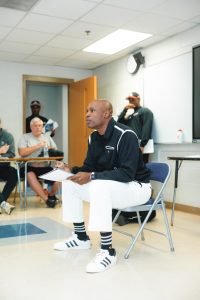 This past Monday, I had the honor of hosting a “Coaching Mastery Summit” for Atlanta Public Schools baseball and softball coaches, sponsored by the LEAD Center For Youth. This wasn’t just another coaches clinic—it was an intentional experience designed to challenge the way we think about coaching.
This past Monday, I had the honor of hosting a “Coaching Mastery Summit” for Atlanta Public Schools baseball and softball coaches, sponsored by the LEAD Center For Youth. This wasn’t just another coaches clinic—it was an intentional experience designed to challenge the way we think about coaching.
Traditionally, coaching clinics focus heavily on what to do—teaching drills, mechanics and strategies. But for coaches to be truly effective, we must first understand our why before we dive into the what and how. Coaching is not just about running plays or teaching mechanics; it’s about transformation, accountability and measurable impact.
Coaching Beyond the Title
While I’ve been coaching for more than 25 years, I didn’t truly become a coach until I had pivotal experiences that forced me to step beyond just wearing the title. A true coach doesn’t simply teach skills; a true coach guides, challenges, and holds themselves and their players accountable for success and failure.
When we allow players on our teams, we become part of their journey—whether they reach their full potential or fall short. That level of responsibility demands that we approach coaching with the same level of professionalism, discipline, and accountability expected in other fields.
Think about the title of “doctor.” A doctor is a practitioner and scholar, earning their title through rigorous study and application. Dr. J, one of my favorite basketball players, carries the name “Doctor” because of his skill and entertainment value—but you wouldn’t go to him if you were sick.
We must distinguish between those who simply wear the title of coach and those who actively practice and master the craft. True coaches operate with intent, accountability, and a commitment to measurable impact.
The 5 Pillars of an Effective Coach
To be considered a true coach—one who deserves the title—you must embody the following five pillars:
- Mission-Driven Leadership – A coach must have a clear mission that goes beyond winning games. What are you developing in your players? How are you shaping their character?
- Standards, Expectations and Accountability – Coaching requires clear standards for performance, behavior and discipline. Players must know what is expected of them, and coaches must hold themselves and their athletes accountable.
- Frameworks for Development – Teaching is more than just giving instructions. A great coach understands how athletes learn, how to communicate effectively, and how to create structured development pathways for their players.
- Measurable Outcomes – Success isn’t just a feeling—it’s measurable. A great coach can point to data, progress and evidence of impact in their athletes’ growth.
- A Plan for the End – A coach must guide players beyond the season. What happens when their playing days are over? What life skills have they gained? What doors have you helped them open?
Redefining the “Coaches Clinic”
This Coaching Mastery Summit wasn’t just about teaching coaches—it was about transforming them. It was fitting that we hosted this experience at Booker T. Washington High School, a historic institution celebrating 100 years of existence.
Legends such as Dr. Martin Luther King Jr., Lena Horne, Donn Clendenon (1969 World Series MVP), Othello “Chico” Renfro (Negro League Ballplayer) and James “Red” Moore (Negro League Ballplayer) have walked those halls, making it a powerful space for education and transformation.
For coaches to truly earn the title and responsibility of coaching, we must push beyond just knowing the game—we must understand why, develop real frameworks for impact and be held accountable for the growth and success of our players.
This was more than a clinic. It was a summit of scholars in coaching, dedicated to mastering the art, science and responsibility of leading young athletes.
Are You Just a Coach by Title—Or Are You a Practitioner of Coaching?
The question we must ask ourselves is: Do we simply hold the title of “coach,” or are we actively shaping lives, building futures and mastering our craft?
Let’s commit to raising the standard of coaching. Let’s redefine what it means to coach with purpose, discipline, and measurable impact.
What steps will you take today to become not just a coach in title, but a true practitioner of coaching?
Remember: Intelligence tops being smart.
For more information, visit www.diamonddirectors.com today.
If you found this inspiring and thought-provoking, or if you have any questions, comments or concerns, add me on Discord and let’s go deeper.
C.J. Stewart has built a reputation as one of the leading professional hitting instructors in the country. He is a former professional baseball player in the Chicago Cubs organization and has also served as an associate scout for the Cincinnati Reds. As founder and CEO of Diamond Directors Player Development, C.J. has more than 22 years of player development experience and has built an impressive list of clients, including some of the top young prospects in baseball today. If your desire is to change your game for the better, C.J. Stewart has a proven system of development and a track record of success that can work for you.

Leave a Reply